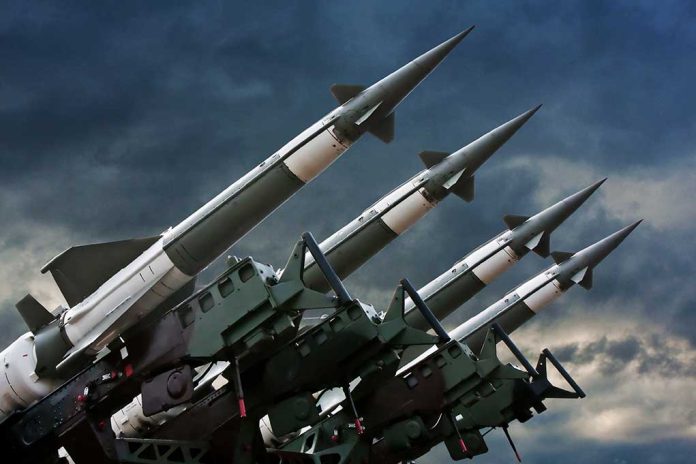
US and UK officials sound the alarm over alleged Russia-Iran nuclear cooperation, stoking fears of a new global threat.
At a Glance
- US and UK fear Russia is sharing nuclear secrets with Iran in exchange for ballistic missiles
- Iran has transferred Fath 360 close-range ballistic missiles to Russia for potential use in Ukraine
- Western powers condemn Iran’s uranium enrichment, citing lack of civilian justification
- G7 calls for immediate halt to Iran-Russia weapons transfers
Alleged Nuclear Cooperation Raises Concerns
American and British leaders have expressed grave concerns over reports suggesting Russia may be sharing nuclear secrets with Iran in exchange for ballistic missiles. This alarming development has sent shockwaves through Western capitals, as it potentially represents a significant escalation in global tensions. The alleged cooperation between these two heavily sanctioned nations has prompted fears of a new axis of power emerging on the world stage.
US Secretary of State Antony Blinken highlighted the gravity of the situation during a press conference last Tuesday. He stated, “For its part, Russia is sharing technology that Iran seeks, this is a two-way street, including on nuclear issues as well as some space information.” This revelation underscores the potential for a dangerous exchange of advanced technologies between the two nations, which could have far-reaching consequences for global security.
Iran’s provision of ballistic missiles in direct support of Russia’s war against Ukraine is a threat to European and global security. Today, @StateDept and @USTreasury are imposing sanctions on individuals and entities supporting such activities.
— Secretary Antony Blinken (@SecBlinken) September 11, 2024
Iran’s Ballistic Missile Transfer to Russia
Adding fuel to the fire, recent reports confirm that Iran has transferred shipments of Fath 360 close-range ballistic missiles to Russia. These missiles, with a range of approximately 75 miles, could potentially be deployed against Ukraine within weeks. The Pentagon has expressed serious concern about this development, as it could lead to increased civilian casualties in the ongoing conflict.
“The United States has confirmed reports that Iran has transferred shipments of Fath 360 close-range ballistic missiles to Russia, which we assess could employ them within weeks against Ukraine, leading to the deaths of even more Ukrainian civilians,” said Pentagon Press Secretary Air Force Maj. Gen. Pat Ryder during a briefing today. – Source
This transfer of weaponry has been met with strong condemnation from the international community. The G7 foreign ministers issued a joint statement calling for an immediate halt to such transfers, describing them as “a direct threat to the Ukrainian people as well as European and international security more broadly.”
Iran’s Nuclear Program Under Scrutiny
The alleged cooperation between Russia and Iran has brought renewed attention to Tehran’s nuclear program. Western powers, including Britain, France, and Germany, have warned that Iran’s stockpile of highly enriched uranium has grown significantly without credible civilian justification. This development has intensified fears about Iran’s nuclear ambitions and its potential to develop atomic weapons.
“continued to grow significantly, without any credible civilian justification.” – Source
The International Atomic Energy Agency reported that Tehran has approximately 313.2 pounds of uranium enriched up to 60%. This is particularly concerning given that a nation could theoretically produce a nuclear weapon with roughly 92.5 pounds of uranium enriched to this level. Iran, however, maintains that it does not seek to create a nuclear bomb and that its nuclear program is for peaceful purposes only.
International Response and Implications
The alleged cooperation between Russia and Iran has prompted a strong response from the international community. The G7 has condemned the arms deal between the two nations, calling for an immediate end to the exchange. Additionally, the United States and its allies had previously warned Iran against delivering ballistic missiles to Russia, viewing such actions as a threat to European security.
“a direct threat to European security” – Source
As tensions continue to escalate, the international community remains on high alert. The potential for a nuclear-armed Iran, coupled with Russia’s ongoing aggression in Ukraine, presents a complex and dangerous geopolitical landscape. The coming weeks and months will be crucial in determining how this situation unfolds and what measures the West will take to address these growing threats to global security.
Sources:
- US, UK concerned Russia may be assisting Iran with nuclear weapons program —report
- Iran Gives Russia Short-Range Missiles, While U.S., Partners Expect to Keep Bolstering Ukrainian Air Defense














